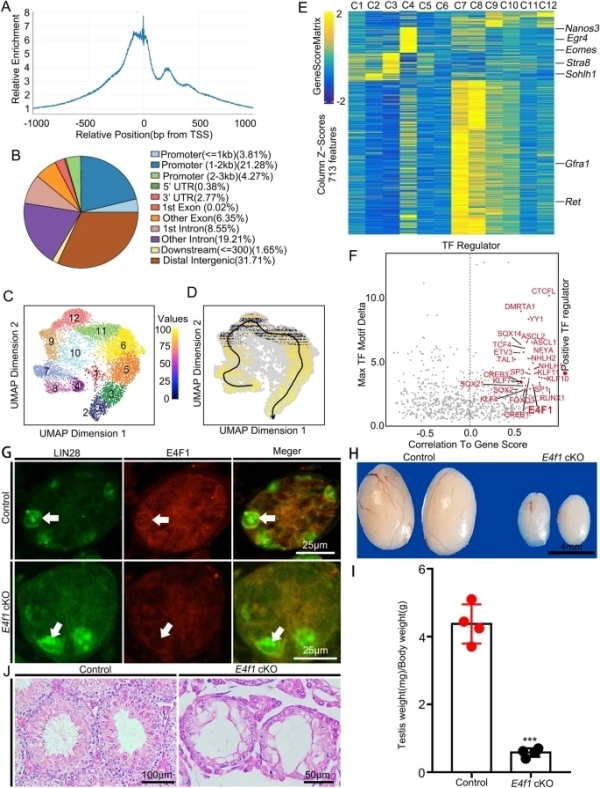Spermatogonial stem cells (SSCs) provide a foundation for robust and continual spermatogenesis in mammals. SSCs self-renew to maintain a functional stem cell pool and differentiate to supply committed progenitors. Metabolism acts as a crucial determinant of stem cell fates; however, factors linking metabolic programs to SSC development and maintenance are poorly understood.
We analyzed the chromatin accessibility of undifferentiated spermatogonia at the single-cell level and identified 37 positive TF regulators that may have potential roles in dictating SSC fates. The transcription factor E4F1 is expressed in spermatogonia, and its conditional deletion in mouse germ cells results in progressive loss of the entire undifferentiated spermatogonial pool. Single-cell RNA-seq analysis of control and E4f1-deficient spermatogonia revealed that E4F1 acts as a key regulator of mitochondrial function. E4F1 binds to promotors of genes that encode components of the mitochondrial respiratory chain, including Ndufs5, Cox7a2, Cox6c, and Dnajc19. Loss of E4f1 function caused abnormal mitochondrial morphology and defects in fatty acid metabolism; as a result, undifferentiated spermatogonia were gradually lost due to cell cycle arrest and elevated apoptosis. Deletion of p53 in E4f1-deficient germ cells only temporarily prevented spermatogonial loss but did not rescue the defects in SSC maintenance.
Emerging evidence indicates that metabolic signals dictate stem cell fate decisions. In this study, we identified a list of transcription regulators that have potential roles in the fate transitions of undifferentiated spermatogonia in mice. Functional experiments demonstrated that the E4F1-mediated transcription program is a crucial regulator of metabolism and SSC fate decisions in mammals.
This result was published in Cell & Bioscience with the title of "Transcription factor E4F1 dictates spermatogonial stem cell fate decisions by regulating mitochondrial functions and cell cycle progression".
The link below will guide you to the reading:
https://cellandbioscience.biomedcentral.com/articles/10.1186/s13578-023-01134-z

Inactivation of E4f1 in spermatogonia leads to abnormal spermatogenesis
